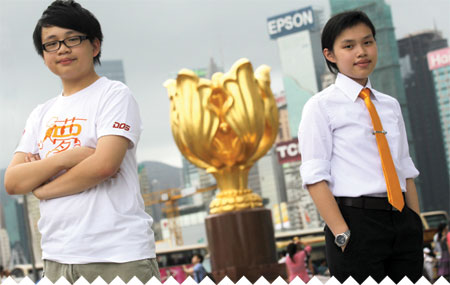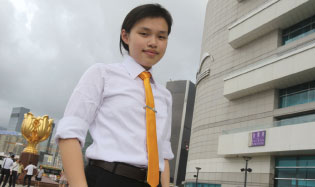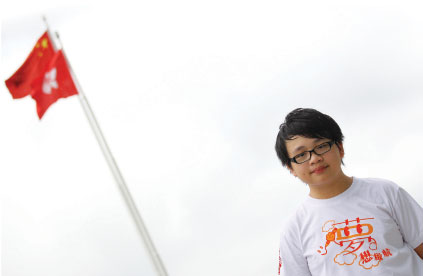Born in 1997: Post-handover national identity
Updated: 2012-07-25 07:10
By Kahon Chan(HK Edition)
|
|||||||
|
Chris Law Ho-ka (right) and Wilho Lung are the children of 1997. Both consider themselves as Chinese - not Hongkonger, nor 'Chinese-Hongkonger'. Kahon Chan / China Daily |
The children of 1997 are moving out of their comfort zone, given a glimpse into the society through liberal studies. More recently, they've been seen engaging in more social activities. How do they view the city, the people and their nation? Kahon Chan reports.
The month of June has been a stressful time for most 15-year-olds, but for Chris Law Ho-ka, she could slack a bit with the ongoing exam: Simply because she will enrol into a new school in the next academic year.
And it was no coincidence that she will head for the United Kingdom.
In 1962, the Hong Kong government introduced the "oversea education allowance" to lure local elites to join the civil service. Children of eligible government staffers were granted scholarships to study in the United Kingdom until the age of 19.
The policy was scrapped a year before the handover, but Law still benefits since her parents had been hired by public institutions before 1996. "I won't be able to go without the sponsorship," the girl said.
She will spend at least three years in a boarding school in the UK. For Law and her family, there is little alien culture in all this, except for one detail in Law's parents' marriage certificate. "They used the word Bachelor to call my father. I reckon the British are elegant and romantic people," she said.
Due to insufficient education on national history, the post-97 Hong Kongers have a hard time to draw an elaborate picture of colonial Hong Kong.
"Hong Kong was a fishing village, then it grew into a prosperous economy like now. My impression generally stays on the surface," Wilho Lung, another 15-year-old, says about his view of the city's colonial period. He said he could not remember his teacher explaining the multiple-stage transitions that the urban jungle had gone through.
|
Chris Law Ho-ka, who plans to enrol herself to a new school in the fall, wants to become a lawyer. Kahon Chan / China Daily |
Law and Lung are both the children of 1997, but they have been raised in different settings.
Lung's father, George Lung Chee-ming, is a member of the Chinese People's Political Consultative Conference (CPPCC) and an ex-chairman of the Hong Kong Youth Exchange Promotion United Association.
Lung joined his first exchange tour four years ago and is now part of the organizing team. "It is impossible to showcase the whole nation in one exchange tour," he said. "We do want to achieve it so, it is a question of how to achieve this."
The most recent focus of the tour to Hainan province, for instance, was the rationale behind the 12th Five-Year Plan laid out by the central government.
In addition to first-hand experience, Lung's school, the Heung To Middle School, also gives lessons on the nation's basic facts, such as the emblem, and has a dedicated "national education corner". Lung therefore found the proposed subject of national education favorable.
"National education can let students learn more about China," he said. "At least when a foreigner asks what do I know about China, I am able to explain the difference between the National People's Congress and CPPCC."
He insisted that good exposure to knowledge is crucial to assertive mindsets. "It is my own thinking and I will not let others brainwash me. The key is to clearly identify my own position and stick to it."
Chris Law also recently joined a school tour to Guangdong. While she was blown away by a massive printing press at a Guangzhou-based newspaper, she was most stunned to learn about the challenge of social work on the mainland.
"There is certification for social workers, but it becomes useless when the people know so little about them. They don't ask for help," she said.
Her group also paid a visit to an ice cream factory - instead of a mindless feast of cold desserts, they had a dialogue on competition between state enterprise and private business.
Her school, as she put it, has built a liberal environment for their expressions. One of her schoolmates at the United Christian College (Kowloon East) is young activist Joshua Wong. An interview clip of Wong had gone viral on the Internet for his mature analysis.
Law, a big fan of history, has no problem in appreciating the greatness and comprehending the shortcomings of the culture and society of the motherland. She believes unbiased history lessons are more effective in establishing a sense of nation in young Hongkongers.
"If students are better informed about the past, they are better positioned to figure out their identities. They will spontaneously embrace patriotism," she said.
She holds the view that patriotism should be translatable into action. Having learned about unattended children in villages during the tour, for instance, Law thought of factoring in family care if she hired migrant workers.
"If a person is patriotic enough, he should help the country to maintain integrity and make policies for the sake of the people," she said. "We should have the passion to make the nation better."
|
Wilho Lung says at least national education can help him to tell the difference between the National People's Congress and CPPCC. Kahon Chan / China Daily |
Wilho Lung's idea of patriotism was straight forward. "The tie between a father and a son is impossible to split. Blood is thicker than water," he said.
Both Lung and Law were aware of some fellow Hongkongers who miss the colonial days. Lung reckons the British had made their presence felt in Hong Kong through education. Law thinks her parents were not actually missing British rule, but rather the good old times that permitted better social mobility.
Despite the different exposure and views, both Law and Lung came to a conclusion in the interviews that they are Chinese - not Hongkonger, nor "Chinese-Hongkonger".
They are the minority. In 2011, the Central Policy Unit commissioned the City University of Hong Kong to survey 1,445 students from six local schools for their identity recognition. Less than a quarter of the students picked a single identity (Chinese or Hongkonger). The rest of them picked both (see side story).
Law elaborated her choice. "We are Chinese because we have inherited the Chinese culture, rather than the sovereignty which was handed over to China. I don't think we have ever claimed ourselves to be British because of the British rule," she said.
The 1997 kids share one unique experience - the SARS outbreak in 2003 had stalled their kindergarten graduation ceremony. The swine flu alert in 2009 also halted their primary school ceremony. Law said some of her classmates had never attended a single graduation ceremony until now.
Three years from now, they will turn to new pages of life. Lung planned to dig deeper into world history in future to cultivate his personal interest, whilst Law aspires to become a lawyer.
"If we fill the loopholes in laws, we can help a lot of people," she said. "Good laws will benefit hundreds of thousands of people."
(HK Edition 07/25/2012 page4)


